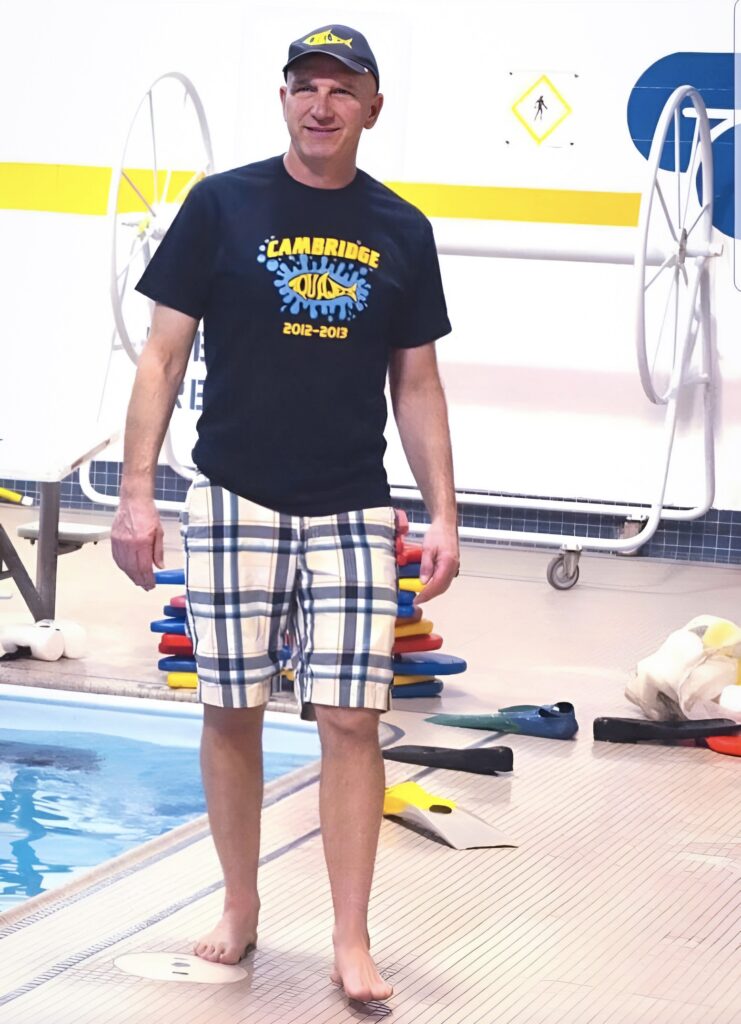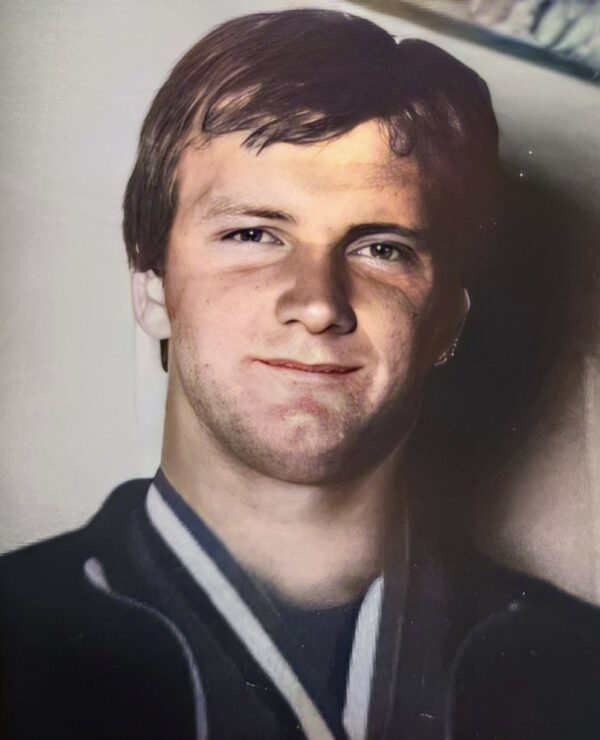Although Ron Campbell was a top-notch swimmer during his competitive days and a member of Canada’s national team for four years — he won the senior nationals three times in the 100 m breaststroke and was ranked in the top 20 in the world — it was as a builder with the Cambridge Aquajets swim club that he distinguished himself locally.
As of the spring of 2023, Campbell has been coaching the club for 37 years—36 as head coach—developing several national-calibre athletes along the way. In 1998, he was the COA Coach of the Year and in 2008 he was named Cambridge’s Sports Contributor. He has also been a board member with the Canadian Coaches and Teachers Association.
A Montreal native, Campbell began swimming competitively in Montreal as an eight-year-old with the Pointe Claire Swim Club under legendary coach George Gate, regarded as the father of modern Canadian swimming. Gate coached the 1968 Canadian Olympic team and was head coach of the Canadian team at the first world championships in Belgrade in 1973.
Swimming was a family affair for the Campbells during those formative years on Montreal’s west island. His siblings—two older sisters and a brother —were national-level swimmers. “We did a lot of swimming,” he recalls.

Campbell still remembers how, following Canada’s dismal showing at the 1968 Mexico Olympics, Gate sat his swimmers down to tell them Canada needed to up its game when it came to swimming.
“It was a big team,” said Campbell, “maybe 200 kids, and we were up in the bleachers. He looked up and seemed to be upset. We hadn’t won anything much in Mexico, and he was pacing back and forth.”
“Somebody here has got to start swimming faster so that we can get a medal out of you guys. The only gold medal we got, a horse had to get it for us, and that was it. So somebody here has got to do something.”
The 18th Olympiad was the first in which Canadian athletes (139) marched under the new maple leaf flag. James Elder, Jim Day and Thomas Gayford won Canada’s only gold medal in the team jumping grand prix, though Canadian swimmers won three silvers and a bronze.
Gate. a veteran of the British Royal Navy in WWII, died in 2014 at the age of 89.
When Campbell was 15 his family moved to Ontario in what was a mass exodus of English-speaking residents in Montreal. They settled in Waterloo, where his father worked for Raytheon.
Campbell enjoyed other sports as a youngster, such as hockey and soccer, but upon arriving in Waterloo, he focussed more on soccer and football. After breaking his leg badly, he returned to swimming, settling in with the Kitchener YMCA team in the old pool downtown after the Kitchener Tarpins showed little interest in him.
On those early morning practices when his volunteer coach didn’t show, the young swimmers would play ping pong until their parents picked them up.

One day, while riding his bike in Waterloo, he noticed construction at the end of the Laurier campus adjacent to King Street, learning they were building a 50-metre pool. Back then Laurier, which had just transitioned from being Waterloo Luthern University, had few swimmers, so Campbell and a dedicated group of other swimmers had the pool almost to themselves. “No one was using it. We had a key and ran our own practices. We just sort of ran the show.”
He attended Bluevale Collegiate for most of his high school years and made the national team, as a breatstroker, in his final year. Although there was some interest from American schools, Campbell followed the advice of Swim Canada to stay in Canada and attend a Canadian university. He chose the University of Waterloo, which had a 25-yard pool.
He excelled at Waterloo in the water, making the national team in each of his years there and winning nine medals in provincial competitions and 14 at the national level and being a key member of the UW national championship swimming team.
He was at the Olympic trials in 1976, but at 17, had not reached his peak, though he came close to making the team. A year later, as one of the top-15-ranked swimmers in the world, he competed for Canada at the World Student Games in Sophia, Bulgaria. “That was exciting.”
He graduated from Waterloo in 1979 with a BA in English, and was inducted into the University of Waterloo’s Sports Hall of Fame in 1987. At the time, he still held four UW simming records.
“It was a real honour,” he said. “I loved competing and going to meets. And talking to guys and getting in their heads. There was no Internet back then so you didn’t know a lot about the other swimmers and you had to find an edge somehow. All in good fun.”
Being a part of the national team during his university years helped him get through school. “In the three years I was there we won the championship every year so that was pretty exciting for us.”
Needless to say, they had a strong team. “It was a great team,” and although their pool was not a great one, it was enough. “It was 25 yards, six lanes, but deep and a good pool to train in.”
He cherishes those years. “The Phys. Ed. Complex (PAC) was a great complex.” In addition to the pool, there were the main and secondary gyms. “Going to the basketball and volleyball games was memorable. Seymour Hadwen was a big player back then. I was there when they won the CIAU championship. The place went bananas. It was insane.”
Near the end of one academic year he went on a two-week trip with Swim Canada but failed to mention this to his professors. “They didn’t seem to care about athletes at all.” When he returned he was surprised to learn, upon attending one class, that they were writing the final exam in class.
Before retiring from competitive swimming, Campbell was approached by a couple of coaches at his final meet, in Vancouver, saying there were three coaching opportunities. He had been a high-profile swimmer, once ranked among the top breaststrokers in the world, and that provided an entry into the coaching world. He first went to Ottawa, then to London, where he coached for three years, and then to Winnipeg for a year before accepting the coaching opportunity with the Cambridge Aquajets.
He began with the Aquajets in 1986, taking over from Kevin Auger. Before Campbell attended university, he admired a local KW swimmer, Dave Heinbuch, who won a silver medal at the Pan Am Games in Mexico (1975) and competed in the 200-metre breaststroke at the 1976 Montreal Olympics. “He was kind of our hero, but we also had another KW swimmer who made the team.”
As of 2023 Heinbuch was still coaching at the University of Ottawa. He was named OUA coach of the year in 2017-18.
Campbell’s tenure in Cambridge began well. ” The parent group was very welcoming and they were very deferential. I always felt there was a lot of respect and a good healthy distance btween the parents and what we were trying to do with the kids. People really gave you a lot of room to do what you wanted to do.”
As a young coach he worried more about performance, but as he developed through the years as a coach, he saw the wisdom that a friend of his espoused: “It’s relationships before championships.”
“I really enjoyed the struggle of trying to get swimmers to do the best they could, and to be there for them. Everyone has some potential and you try to get the best out of them that you can.”
Although he’s coached some great swimmers through the years, such as fellow CSHF inductee Kurtis MacGillivary, which is understandably rewarding and “a fun part of coaching,” some of the swimmers that he’s enjoyed the most are the non-elite swimmers.
“The good swimmers are going to be a lot faster than the slower ones, every single day, but when the slower ones come up at the end of practice and say ‘Thank you coach,’ and they’re laughing and happy, you say to yourself ‘I must have done something right to have an atmosphere where they can come in and feel they can do their best and enjoy it.’”
For the first 11 years or so his wife Karen helped with the coaching and as they began to raise a family, she did much more than that, of course. Their eldest son, Trevor, is now the head coach of the Aquajets, aided by his younger brother Drew and by dad—Ron typically makes the trek from his home in Southampton to Cambridge a couple times a week to help coach.
“Karen was the mainstay, making things run smoothly, helping to ensure the club was going in the right direction and keeping our family moving the right way. She contributed to any success we’ve had with the club when we were there.”
The team concept is something Ron tried to instill with all his swimmers, from the top level athletes to the average swimmers. Even years after coaching them, he is always pleasantly surprised at seeing them after a long absence.
Over the years he’s filled in countless refereals for his young swimmers applying for college or university. “I’ve done a lot of references for medical school. The reference requests are pretty lengthy but when they get in, I’m excited for them.”
All told, about 16 of his swimmers went to the U.S. on scholarships. Nearly a dozen have become doctors, and many became lawyers, or went on to a host of other occupations and interesting careers.
“COVID was a tough time for a lot of sports, and it was a difficult time for us (at the Aquajets). After more than 30 years, he figured he’d call it a career. “I talked to the club and asked Trevor if he wanted to do it. He’s a great coach. Very empathetic with the kids. They love him.”
Being an assistant coach meant he didn’t have to pull away from the sport completely.
He enjoys kayaking, and life in general, in Southampton, where they’ve had a cottage for years. “It’s great up here. I love it, watching the lake through the seasons. As a small town, it kind of reminds me of Galt in the early years.”
Make a donation today, and support the Cambridge Sports Hall of Fame.
Cambridge Centre Mall
425 Hespeler RoadUnit #6, PO Box 444 Cambridge, Ontario N1R 8J6
General inquiries: info@cambridgeshf.com Archives and Nominations: cshf1@live.com
© 2025 All Rights Reserved.